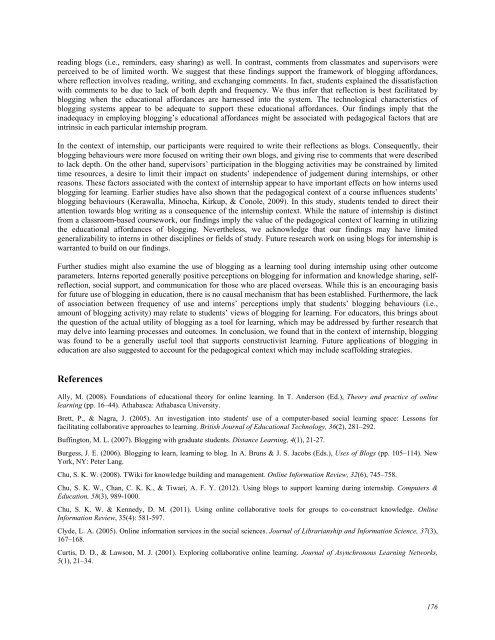April 2012 Volume 15 Number 2 - Educational Technology & Society
April 2012 Volume 15 Number 2 - Educational Technology & Society
April 2012 Volume 15 Number 2 - Educational Technology & Society
You also want an ePaper? Increase the reach of your titles
YUMPU automatically turns print PDFs into web optimized ePapers that Google loves.
eading blogs (i.e., reminders, easy sharing) as well. In contrast, comments from classmates and supervisors were<br />
perceived to be of limited worth. We suggest that these findings support the framework of blogging affordances,<br />
where reflection involves reading, writing, and exchanging comments. In fact, students explained the dissatisfaction<br />
with comments to be due to lack of both depth and frequency. We thus infer that reflection is best facilitated by<br />
blogging when the educational affordances are harnessed into the system. The technological characteristics of<br />
blogging systems appear to be adequate to support these educational affordances. Our findings imply that the<br />
inadequacy in employing blogging’s educational affordances might be associated with pedagogical factors that are<br />
intrinsic in each particular internship program.<br />
In the context of internship, our participants were required to write their reflections as blogs. Consequently, their<br />
blogging behaviours were more focused on writing their own blogs, and giving rise to comments that were described<br />
to lack depth. On the other hand, supervisors’ participation in the blogging activities may be constrained by limited<br />
time resources, a desire to limit their impact on students’ independence of judgement during internships, or other<br />
reasons. These factors associated with the context of internship appear to have important effects on how interns used<br />
blogging for learning. Earlier studies have also shown that the pedagogical context of a course influences students’<br />
blogging behaviours (Kerawalla, Minocha, Kirkup, & Conole, 2009). In this study, students tended to direct their<br />
attention towards blog writing as a consequence of the internship context. While the nature of internship is distinct<br />
from a classroom-based coursework, our findings imply the value of the pedagogical context of learning in utilizing<br />
the educational affordances of blogging. Nevertheless, we acknowledge that our findings may have limited<br />
generalizability to interns in other disciplines or fields of study. Future research work on using blogs for internship is<br />
warranted to build on our findings.<br />
Further studies might also examine the use of blogging as a learning tool during internship using other outcome<br />
parameters. Interns reported generally positive perceptions on blogging for information and knowledge sharing, selfreflection,<br />
social support, and communication for those who are placed overseas. While this is an encouraging basis<br />
for future use of blogging in education, there is no causal mechanism that has been established. Furthermore, the lack<br />
of association between frequency of use and interns’ perceptions imply that students’ blogging behaviours (i.e.,<br />
amount of blogging activity) may relate to students’ views of blogging for learning. For educators, this brings about<br />
the question of the actual utility of blogging as a tool for learning, which may be addressed by further research that<br />
may delve into learning processes and outcomes. In conclusion, we found that in the context of internship, blogging<br />
was found to be a generally useful tool that supports constructivist learning. Future applications of blogging in<br />
education are also suggested to account for the pedagogical context which may include scaffolding strategies.<br />
References<br />
Ally, M. (2008). Foundations of educational theory for online learning. In T. Anderson (Ed.), Theory and practice of online<br />
learning (pp. 16–44). Athabasca: Athabasca University.<br />
Brett, P., & Nagra, J. (2005). An investigation into students' use of a computer-based social learning space: Lessons for<br />
facilitating collaborative approaches to learning. British Journal of <strong>Educational</strong> <strong>Technology</strong>, 36(2), 281–292.<br />
Buffington, M. L. (2007). Blogging with graduate students. Distance Learning, 4(1), 21-27.<br />
Burgess, J. E. (2006). Blogging to learn, learning to blog. In A. Bruns & J. S. Jacobs (Eds.), Uses of Blogs (pp. 105–114). New<br />
York, NY: Peter Lang.<br />
Chu, S. K. W. (2008). TWiki for knowledge building and management. Online Information Review, 32(6), 745–758.<br />
Chu, S. K. W., Chan, C. K. K., & Tiwari, A. F. Y. (<strong>2012</strong>). Using blogs to support learning during internship. Computers &<br />
Education, 58(3), 989-1000.<br />
Chu, S. K. W. & Kennedy, D. M. (2011). Using online collaborative tools for groups to co-construct knowledge. Online<br />
Information Review, 35(4): 581-597.<br />
Clyde, L. A. (2005). Online information services in the social sciences. Journal of Librarianship and Information Science, 37(3),<br />
167–168.<br />
Curtis, D. D., & Lawson, M. J. (2001). Exploring collaborative online learning. Journal of Asynchronous Learning Networks,<br />
5(1), 21–34.<br />
176

















